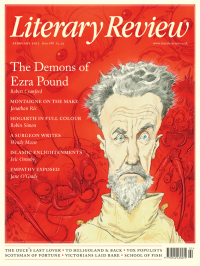Adrian Tinniswood
Roads Less Travelled
The Nine Lives of John Ogilby: Britain’s Master Map Maker and His Secrets
By Alan Ereira
Duckworth Overlook 354pp £25
Historians of Restoration London know John Ogilby (c 1600–1676) for the marvellous post-Fire survey of the capital that he produced with his step-grandson, William Morgan, which was published in 1677; or as the choreographer of the celebrations accompanying Charles II’s coronation, of which the Earl of Clarendon said, ‘the whole Show was the most glorious … that had ever been seen in England’. Literary historians remember Ogilby for the series of translations of Virgil and Homer he produced in the 1650s and 1660s, lavish works that earned unwarranted sneers from later translators, including Dryden and Pope.
Scholars of 17th-century drama know him as the man responsible for opening Ireland’s first theatre in Dublin in 1637. And geographers remember him for the series of atlases he produced in the early 1670s, covering Africa, Japan, America, China and the rest of Asia, and for Britannia (1675), one of

Sign Up to our newsletter
Receive free articles, highlights from the archive, news, details of prizes, and much more.@Lit_Review
Follow Literary Review on Twitter
Twitter Feed
It wasn’t until 1825 that Pepys’s diary became available for the first time. How it was eventually decrypted and published is a story of subterfuge and duplicity.
Kate Loveman tells the tale.
Kate Loveman - Publishing Pepys
Kate Loveman: Publishing Pepys
literaryreview.co.uk
Arthur Christopher Benson was a pillar of the Edwardian establishment. He was supremely well connected. As his newly published diaries reveal, he was also riotously indiscreet.
Piers Brendon compares Benson’s journals to others from the 20th century.
Piers Brendon - Land of Dopes & Tories
Piers Brendon: Land of Dopes & Tories - The Benson Diaries: Selections from the Diary of Arthur Christopher Benson by Eamon Duffy & Ronald Hyam (edd)
literaryreview.co.uk
Of the siblings Gwen and Augustus John, it is Augustus who has commanded most attention from collectors and connoisseurs.
Was he really the finer artist, asks Tanya Harrod, or is it time Gwen emerged from her brother’s shadow?
Tanya Harrod - Cut from the Same Canvas
Tanya Harrod: Cut from the Same Canvas - Artists, Siblings, Visionaries: The Lives and Loves of Gwen and Augustus John by Judith Mackrell
literaryreview.co.uk